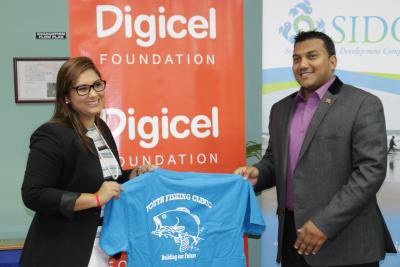Parliamentary Secretary lauds SIDC’s Youth Fishing Clinic … A Breath of Fresh Air!
June 15, 2016: Parliamentary Secretary in the Ministry of Agriculture, Land & Fisheries, Senator Avinash Singh says the launch of the Youth Fishing Clinic by the Seafood Industry Development Company Limited (SIDC) was a “welcomed breath of fresh air” in that the resurgence of youth involvement in the fishing sector through education and practical knowledge, will aid in breaking down the many misconceptions that have often plagued the profession.
Among these misconceptions, he identified with the view that fishing was not seen as a professional, lucrative nor respectable career option.
Senator Singh said: “The Youth Fishing Clinic comes therefore as a welcomed breath of fresh air amidst the mist of archaic practices and beliefs which support the traditional adage that fishing is merely a dirty, degrading, low income form of employment only undertaken by the uneducated.
“Instead, the Clinic promises to close some of the gaps which currently exist; empower our upcoming generation to be more receptive to modern day ideologies of the fish enterprise; and position the industry as a viable alternative to a sustainable livelihood and decent career.”
The Parliamentary Secretary was speaking at the launch of the Youth Fishing Clinic which was hosted by the SIDC in partnership with the Digicel Foundation, on Wednesday 15th June, 2016, at SIDC’s Head Office in Charlieville. The Clinic – which will benefit approximately fifty (50) secondary school students from amongst some of the nation’s rural and coastal communities from the 11th- 15th July, 2016 – aims to highlight areas of good seafood handling practices; the implementation of fishing technologies; fish processing in addition to the types of aquaculture and entrepreneurial business opportunities.
He noted that while the Ministry was reviewing all its youth programmes to ensure that they were adequately aligned to the development of Government’s Agricultural Sector Plan for Trinidad and Tobago (2016-2020), the involvement of the youth demographic in the sector remained critical particularly since there was need to build an institutional knowledge capacity amongst fisher-folk, who for the most part, were of an advanced age with a limited degree of technological education and expertise in the modern day practices of the seafood industry.
As a show of his appreciation to the Clinic’s many partnering stakeholder agencies, Senator Singh had this to say: “Thank you all for your individual and collective roles in developing the human capital of the fishing sector in Trinidad and Tobago.
“May your contribution in the education of these and future young people on the seafood industry, continue to build an industry that is profitable, environmentally sensitive, internationally competitive, socially responsible and sustainable.”






